Starting a chicken farm requires careful planning and the right equipment to ensure a successful, efficient, and sustainable operation. Essential tools not only make daily tasks easier but also contribute to the health and well-being of your chickens. This guide will outline the necessary tools and equipment to establish a productive farm that supports organic practices, aligned with the mission of Green Feather Farming in promoting sustainable and eco-friendly chicken farming.

Chicken Coop Essentials
The chicken coop is the backbone of your farm setup. Proper coop equipment enhances safety, cleanliness, and comfort, which are crucial for maintaining a healthy flock. Below are some essential coop components every chicken farm should have.
- Brooders: For those starting with chicks, brooders are essential to provide a warm, controlled environment that helps young chickens thrive. Chicks are highly vulnerable to cold and need a consistent temperature to survive and grow. Investing in electric brooders or infrared lamps ensures a steady, safe heat source for chicks during their initial weeks. Infrared heat lamps are especially efficient, as they distribute warmth evenly without producing excessive light, which can stress young chicks.
Brooders should be kept clean and positioned away from drafts or dampness. Many farmers use heat plates as a safer alternative to heat lamps. These devices allow chicks to regulate their body temperature by moving closer to or farther from the heat source. Choosing the right brooder setup is essential for supporting healthy chick development.
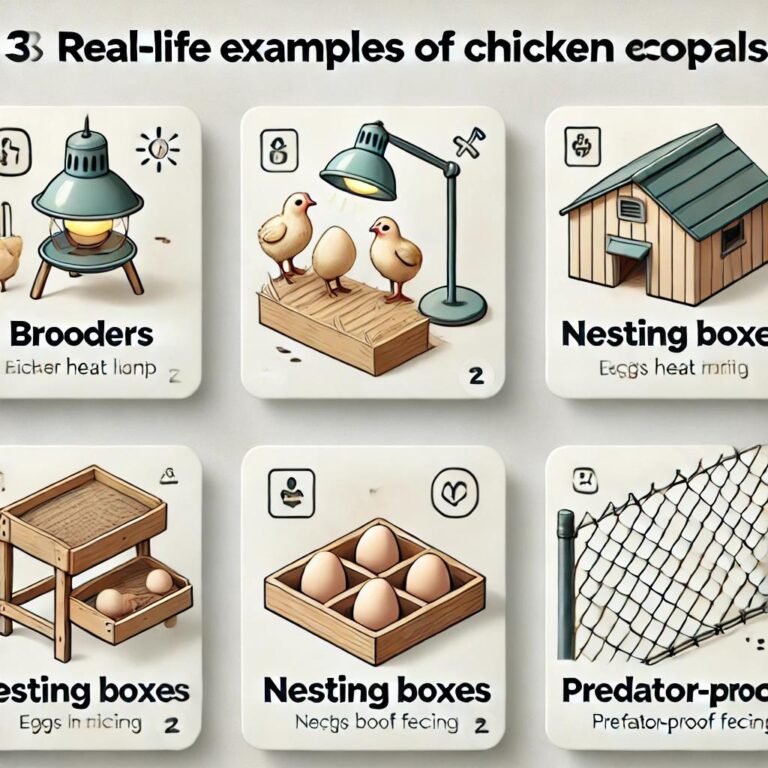
Carousel: Real-Life Examples of Chicken Coop Essentials.
- Nesting Boxes: Essential for egg-laying hens, nesting boxes offer a safe, comfortable space for hens to lay eggs. These boxes need to be clean, dry, and cozy to encourage hens to lay regularly. The general rule is to have one nesting box for every three to five hens, depending on the breed and size. Starting your own organic chicken farm explains how nesting boxes are crucial to maximizing egg production and reducing stress in hens. Adding soft bedding such as straw or pine shavings keeps the nesting area comfortable and helps prevent eggs from breaking.
Position nesting boxes slightly above ground level to discourage hens from roosting on them, which can cause a mess and disrupt egg-laying. For easy egg collection, consider using roll-out nesting boxes that gently roll eggs into a collection tray, keeping them clean and reducing the chance of breakage.
- Perches and Roosts: Chickens naturally roost at night, so perches are a key addition to any coop. Elevated roosts help keep chickens off the ground, contributing to better hygiene and flock health by reducing exposure to dampness, bacteria, and pests. Providing enough roost space is essential to prevent overcrowding, which can lead to stress and aggressive behavior among the birds. Wooden perches are ideal because they are comfortable for chickens to grip and provide insulation during colder months.
Place perches at varying heights to give chickens choice and to accommodate different flock members’ preferences. Ensure that there is adequate spacing between perches to avoid crowding and allow air circulation, which is crucial for coop ventilation.
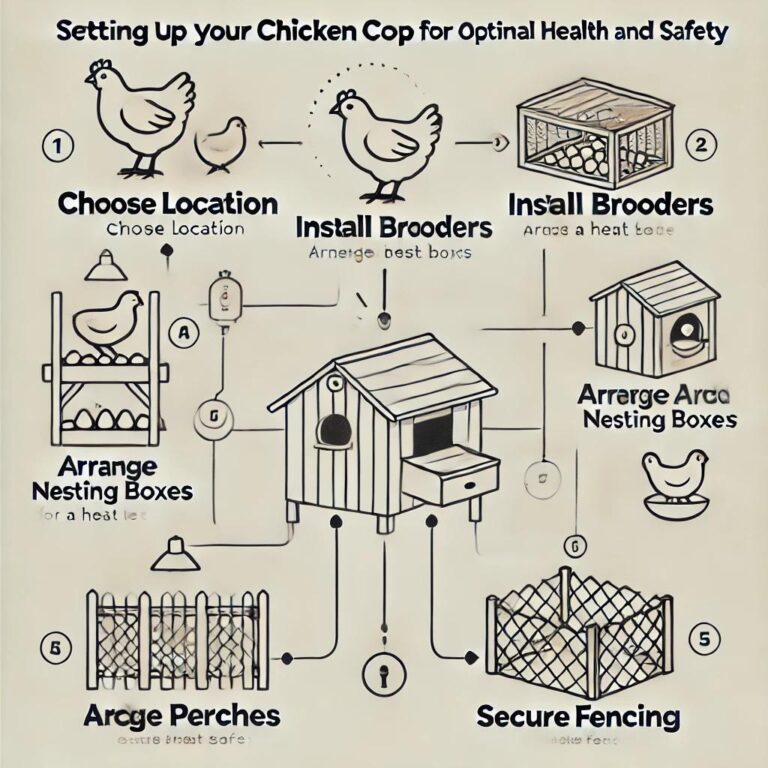
Flowchart: Setting Up Your Chicken Coop for Optimal Health and Safety.
Feeding and Watering Systems
Efficient feeding and watering systems are fundamental to creating a streamlined daily routine that minimizes manual labor while ensuring chickens have consistent access to nutrients and hydration.
- Automatic Feeders: Automatic feeders reduce food waste, control portion sizes, and lower labor requirements. These systems dispense food at regular intervals or are triggered by motion, making it easy to provide a steady supply of feed without constant monitoring. Proper feeding is critical for maintaining chicken health and ensuring they receive the necessary nutrients. For more insights on feeding practices, check out feeding chickens the natural way, which explains optimal feeding methods for organic chickens.
Choose feeders that are designed to minimize spillage and discourage pests. Treadle feeders, which require the chickens to step on a pedal to open the feed access door, can be particularly effective in keeping out rodents and wild birds. Adjustable settings on automatic feeders allow you to control the amount of feed dispensed, helping to manage feed costs while ensuring adequate nutrition.
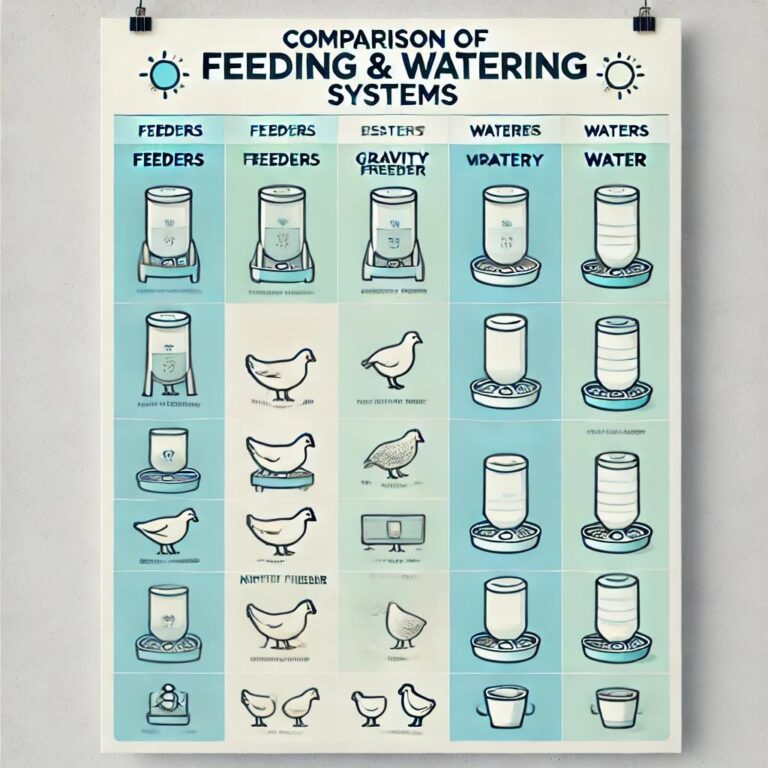
Table: Comparison of Feeding and Watering Systems.
- Automatic Waterers: Clean, fresh water is essential for flock health, and automatic waterers help maintain water levels while reducing the risk of contamination. Common types of automatic waterers include nipple drinkers, cup waterers, and trough systems, all designed to conserve water and maintain cleanliness. Nipple drinkers, for example, release water only when chickens peck at the valve, preventing spillage and keeping the coop dry.
Regular access to fresh water is crucial, especially in warmer climates where chickens can become dehydrated quickly. Automatic waterers help ensure a continuous supply of water, which is not only convenient but also supports better egg production and overall health. Explore different options for automatic waterers on Tractor Supply Co. for various styles and sizes suitable for small to large flocks.
Health and Hygiene Tools
Maintaining flock health is one of the most important aspects of successful chicken farming. Hygiene tools and pest control solutions are essential in preventing diseases and keeping the environment safe and clean.
- Disinfectants and Sanitizing Equipment: Regular disinfection is key to preventing diseases. Organic disinfectants align with sustainable practices and are safe for use in coops. These can be used on feeders, waterers, and nesting areas to reduce bacterial buildup. Organic options include vinegar solutions or specially formulated coop cleaners that do not leave harmful residues.
Disinfecting foot baths placed at the coop entrance help prevent the spread of pathogens from visitors or caretakers. Consistently cleaning surfaces and equipment reduces the risk of common poultry diseases, such as coccidiosis and avian flu, which can devastate a flock if not managed promptly.
- Pest Control Equipment: From mite sprays to rodent traps, pest control tools protect chickens from parasites and predators. Mites and lice are common threats to chickens and should be managed with non-toxic sprays or dust treatments. The daily routines for healthy chickens article covers effective routines for maintaining chicken health, including pest management.
Setting up rodent traps and regularly checking for signs of pests is essential. Using organic pest control solutions prevents harmful chemicals from entering the environment, making it a safer option for both chickens and the surrounding ecosystem. Pest control supplies are available from Farm and Ranch Supplies, offering various tools designed for sustainable farming operations.
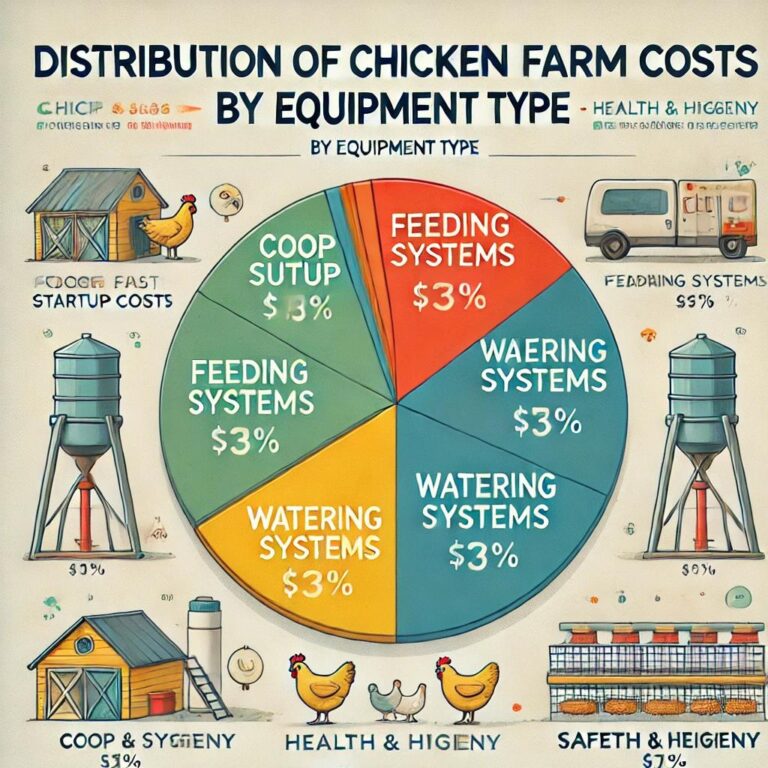
Pie Chart: Distribution of Chicken Farm Startup Costs by Equipment Type.
Safety and Monitoring Equipment
Safety equipment ensures that chickens are protected from predators and environmental hazards, which is crucial for organic farms often situated near natural habitats.
- Predator-Proof Fencing: Durable, predator-proof fencing is critical for safeguarding your flock. Strong, galvanized steel mesh is an effective material that prevents access by common predators such as foxes, raccoons, and hawks. Fencing should be buried at least a foot into the ground to prevent animals from digging under the coop, with additional overhead protection to deter birds of prey.
Adding motion-activated lights or alarms near the coop can further deter nocturnal predators. These small investments can save significant losses by keeping chickens safe from harm. High-quality predator-proof fencing options are available from reputable farm equipment suppliers to keep your chickens secure.
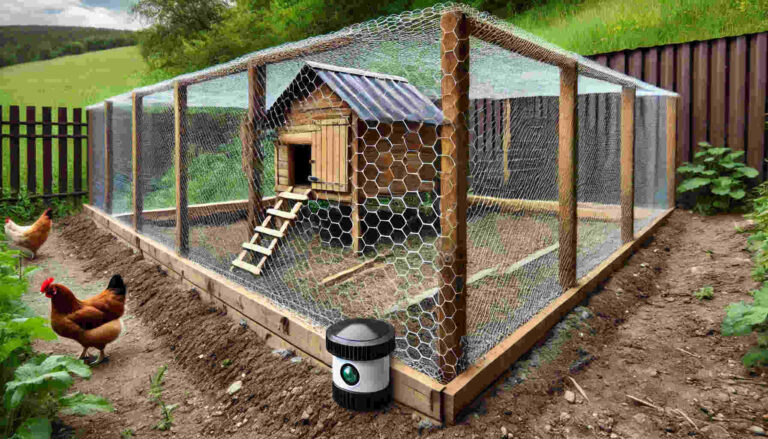
- Surveillance Cameras: Installing cameras helps monitor coop activity and provides valuable insights into flock behavior. Surveillance cameras can alert you to potential issues, such as predator activity or unusual behavior among chickens. Some systems come with night vision capabilities, allowing for round-the-clock monitoring.
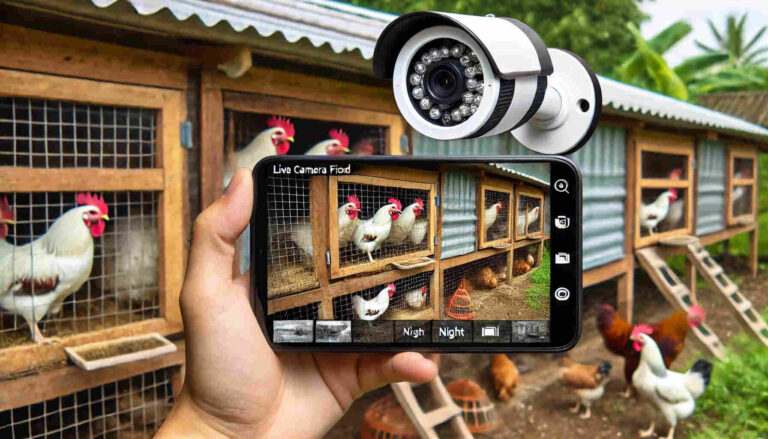
Cameras also enable remote monitoring, which can be particularly helpful if you’re managing the farm alone or need to check in while away. Footage can help identify and resolve problems, whether it’s tracking a predator’s access points or monitoring flock interactions.
Farm Management Tools
Farm management tools are essential for both small and large chicken farms, helping farmers monitor flock health, control climate conditions, and maintain productive systems year-round.
- Record-Keeping Systems: Keeping detailed records on egg production, feeding schedules, health checks, and any treatments administered to the flock provides invaluable insights into flock health and behavior patterns. While traditional pen-and-paper record-keeping works, digital record-keeping systems or mobile apps offer greater convenience and organization. By storing data digitally, you can quickly reference past health records or identify trends that might signal issues early on.
Using record-keeping tools allows farmers to track any changes in egg production or behavioral shifts in chickens, which can help prevent or address health issues before they escalate. Many successful farms also use these records to make informed decisions on flock expansion, seasonal adjustments, and financial planning.
- Climate Control Tools: In regions with extreme seasonal temperatures, climate control equipment is essential to maintain a safe and productive coop environment. In hot climates, ventilation fans, cooling systems, and misters can help prevent heat stress, which can be particularly dangerous for chickens. In colder climates, heaters and insulation help keep chickens comfortable and maintain their productivity.
Heat lamps, thermostats, and automatic ventilation fans can all contribute to a stable coop environment year-round. Maintaining a consistent temperature not only helps chickens stay healthy but also encourages better laying patterns. Managing coop climate effectively aligns with sustainable practices, discussed further in how to build an eco-friendly chicken coop.
Additional Farm Equipment
In addition to the essentials, there are specialized tools that can further streamline farm operations and improve productivity. These tools can make a significant difference in terms of labor efficiency, flock health, and pasture management, especially for organic and sustainable farms.
- Portable Coops (Chicken Tractors): Portable coops, often called chicken tractors, are mobile structures that allow chickens to graze on fresh ground every day. These coops enable rotational grazing, a practice beneficial for both chickens and soil health. Moving chickens to new areas prevents overgrazing, reduces the spread of parasites, and provides chickens with fresh forage, all while fertilizing the land naturally.
Portable coops are particularly useful on small organic farms, as they reduce dependency on commercial feed and provide chickens with a more natural diet. When equipped with a secure frame, wheels, and a weatherproof covering, these portable coops can be moved around easily, offering flexibility and encouraging sustainable farming practices. Many farmers find that portable coops not only improve the health of their chickens but also contribute to better egg flavor and quality due to the chickens’ varied diet.
- Egg Collection Baskets: Efficient egg collection is vital for productivity, and having the right baskets can make the process more convenient and reduce the risk of breakage. Sturdy wire egg baskets allow for airflow, preventing eggs from cracking under pressure, while also making it easier to transport larger quantities at once. Regularly collecting eggs in the morning helps maintain egg quality, prevent crowding in nesting boxes, and discourage broody behavior in hens.
Proper egg collection practices also align well with marketing tips discussed in effective marketing for natural chicken products, especially for farms looking to sell high-quality organic eggs to local markets.
Practical Visuals for Equipment Use
Visuals are incredibly helpful for understanding equipment setup and farm layout. Incorporating visuals like infographics, flowcharts, and temperature zone maps can provide step-by-step guidance and make the learning process more engaging for new farmers.
Suggested Visuals:
- Infographic: “Top 5 Must-Have Equipment for New Chicken Farmers” – Displaying critical tools, including feeders, waterers, nesting boxes, predator-proof fencing, and record-keeping systems.
- Flowchart: “Daily Routine for Efficient Chicken Farm Management” – Outlining essential daily tasks such as feeding, watering, temperature checks, and egg collection. Visualizing this routine helps beginners understand what to prioritize each day.
- Heat Map: “Optimal Temperature Zones in the Chicken Coop” – Showing different temperature requirements based on the flock’s age and climate, which is particularly useful for farms that experience wide seasonal changes.
Interactive Elements: For online resources, consider interactive visuals like an interactive map of coop layout or a clickable guide on managing coop climate. These elements can be embedded on your website to enhance user engagement and help visitors visualize farm management concepts.
Routine Maintenance and Safety Checks
Maintaining the equipment regularly is as essential as choosing the right equipment in the first place. Routine safety checks and equipment maintenance prevent breakdowns and ensure the farm operates smoothly.
- Regular Coop Inspections: Check the coop structure and equipment daily to spot any signs of wear, pest infestations, or loose fencing. Predator-proof fencing, for instance, should be checked for any gaps or weak points to avoid potential breaches by animals like raccoons or foxes.
-
- Water System Checks: Inspect water systems to ensure they are functioning well and free of leaks. Automatic waterers can occasionally clog, so it’s essential to clean them periodically to prevent bacteria buildup and ensure a consistent water supply.
-
- Sanitization Routine: Regular sanitizing of feeding equipment, nesting boxes, and floors is crucial in preventing disease outbreaks. Organic disinfectants can keep your equipment clean without risking contamination, particularly if you are marketing your chickens or eggs as organic.
By establishing a routine maintenance checklist, farmers can stay organized, prevent equipment failures, and promote a healthy environment for chickens.
Conclusion
Investing in the right equipment is a key component of running a successful organic chicken farm. By choosing high-quality, sustainable tools for feeding, climate control, monitoring, and farm management, you set your farm up for long-term productivity. Practical tools such as record-keeping systems and climate control devices make farm operations more efficient, while equipment like portable coops and predator-proof fencing helps promote sustainable and safe farming practices.
As you continue your journey in chicken farming, remember that these tools not only make day-to-day tasks easier but also contribute to the welfare and productivity of your flock. With the right equipment and a commitment to sustainable practices, your farm can grow into a thriving operation that reflects the values of Green Feather Farming, promoting organic and eco-friendly chicken rearing.

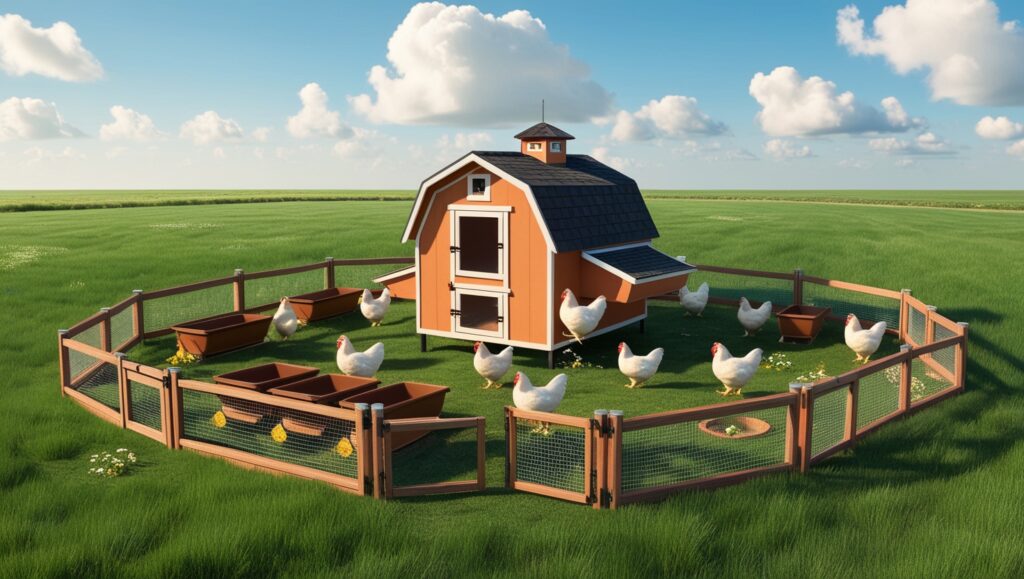
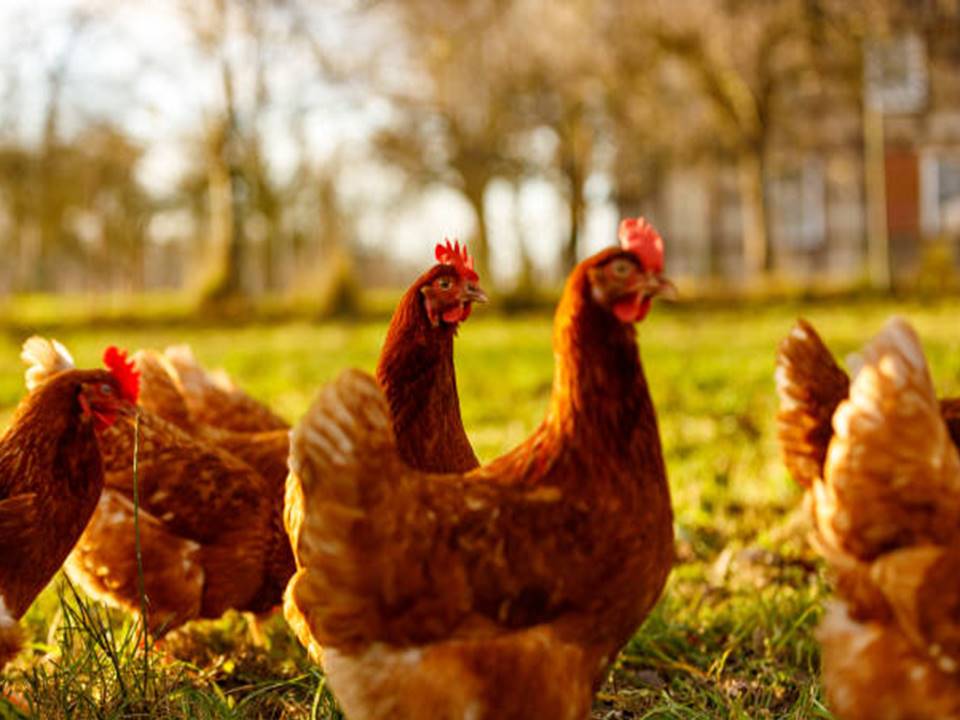
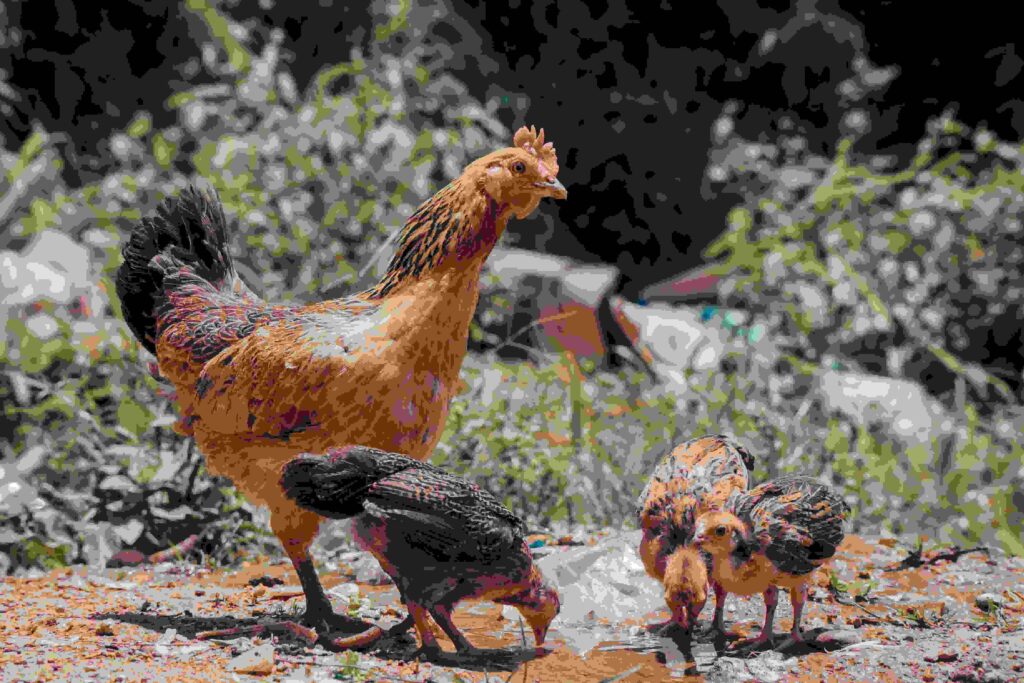
Pingback: Sustainable Chicken Farming: A Guide to Eco-Friendly Coops